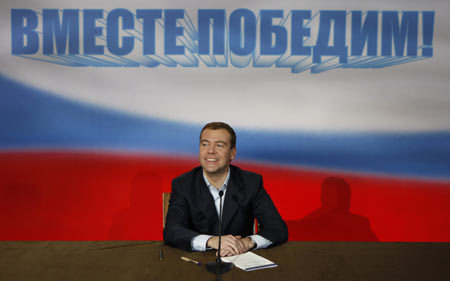|
|
Location:Home - News Center - Medvedev vows to improve gov't structure
Medvedev vows to improve gov't structureMOSCOW -- Russia's president-elect Dmitry Medvedev said on Monday that he would strive to improve government structure and address the issues raised by the incumbent President Vladimir Putin. First Deputy Prime Minister and presidential candidate Dmitry Medvedev smiles during a news conference at his election headquarters in Moscow March 3, 2008. [Xinhua "I am ready to start working on the issues you (Putin) mentioned and look at the structure of the government and deal with the problems you raised," said Medvedev, Russia's first deputy prime minister, who has won the country's fifth presidential election by a landslide. Medvedev secured his overwhelming victory by gaining 70.21 percent of the vote, with 98.4 percent of the ballots counted, Central Election Commission (CEC) figures indicated on Monday. A candidate must obtain more than 50 percent of the vote to win an outright victory. Otherwise, a run-off will be held between the top two front runners in the race. Putin congratulated Medvedev and wished him successes in his responsible work for the benefit of Russia and its citizens. "I believe Dmitry Medvedev will justify the trust people placed in him and will do his best so that new serious results would support the policy for the strengthening of the country, its economy and social sector," said Putin, who is to step down in May. Putin also asked Medvedev to prepare and chair meetings of the State Council, the highest decision-making and consultative body. Medvedev accepted his request. Usually, the head of state prepares and chairs State Council meetings. Now the incumbent president has delegated this function to his successor. At a press conference held after the election, Medvedev said he would continue Putin's set policies. "As for the course that I would like to pursue, it is the path chosen eight years ago," Medvedev said at his election headquarters early Monday. He has also pledged to establish "friendly and partnership relations" with Putin, who has agreed to take the post of prime minister in Medvedev's cabinet. Medvedev, 42, was certain that his "efficient and full-fledged team work" with Putin "could bring interesting results to the country and become a rather positive element in the development" of the nation. He refused to re-distribute power between the president and the prime minister if he is elected. "These powers are stipulated by the Constitution and current legislation. No one is going to change them," Medvedev said, noting the president is legitimate to head foreign policy. Putin ordered on Monday the government to fulfill all social commitments and pledged to increase salaries, pensions and welfare allowances of the Russian people. The outgoing president, who is constitutionally barred from a third consecutive term, also said that the government must review a concept of Russia's development for the years to 2020 no later than in May. The Russian election was monitored by some 235 observers from various international and foreign organizations such as the Parliamentary Assembly of the Council of Europe, the Commonwealth of International States, and the Shanghai Cooperation Organization(SCO). There were 108.94 million eligible voters and 96,301 polling stations throughout the vast country. Russians residing abroad could vote at 364 polling stations in 142 countries. In some remote areas, voting started about two weeks before the polling day. The observers from the SCO said on Monday that Russia's presidential election proceeded smoothly without any violation against election rules. The CEC will release the final results on Friday and the new president will be sworn in on May 7. |
